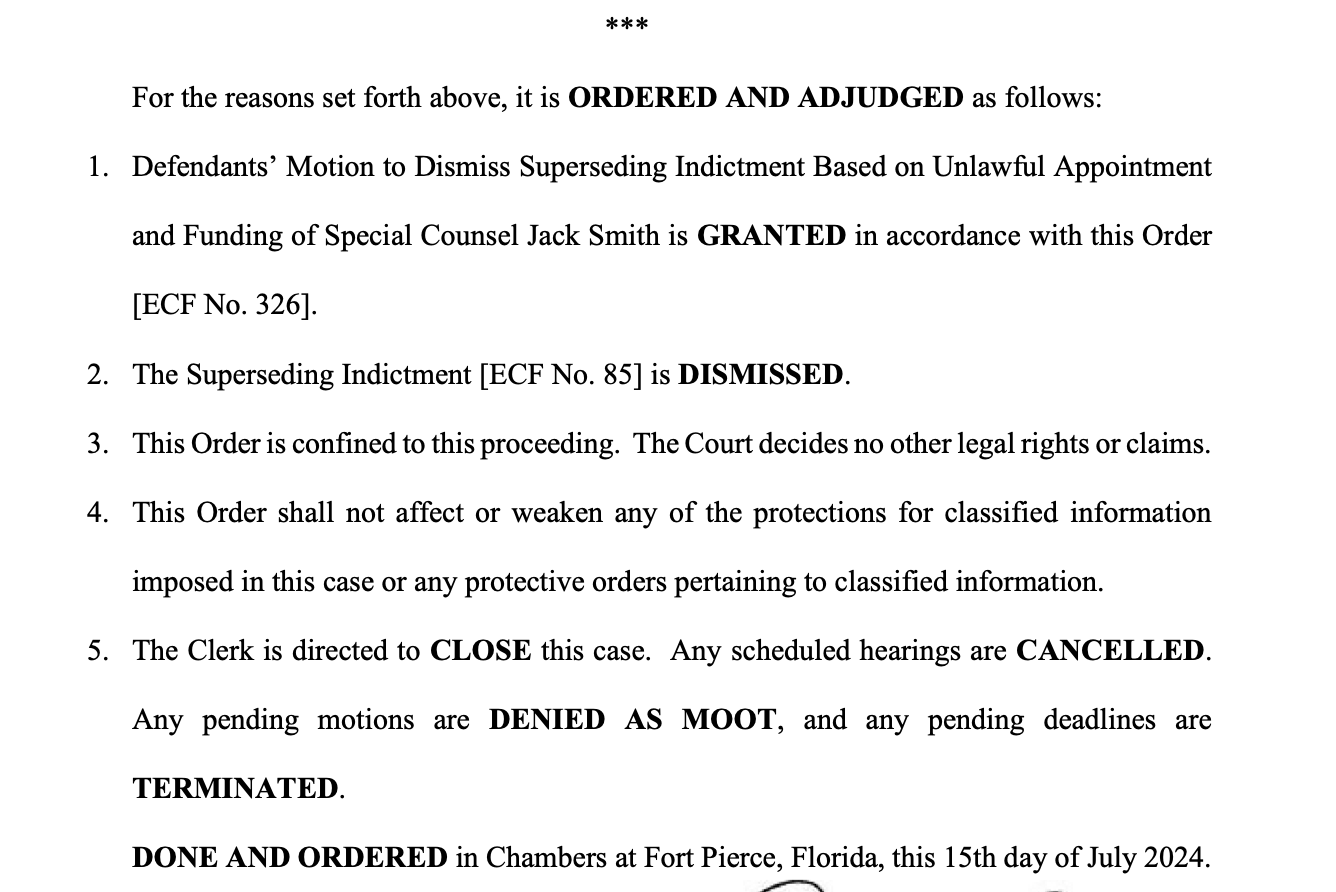
Left: Special Counsel Jack Smith. (AP Photo/J. Scott Applewhite, File); Center: Aileen M. Cannon speaks remotely during a Senate Judiciary Committee hearing (U.S. Senate); Right: Donald Trump speaks with supporters at the Westside Conservative Breakfast, June 1, 2023, in Des Moines, Iowa. (AP Photo/Charlie Neibergall, File)
U.S. District Judge Aileen Cannon on Monday favorably cited Justice Clarence Thomas and her own “careful study” of the issues at play to throw out Donald Trump’s Mar-a-Lago indictment, agreeing that U.S. Attorney General Merrick Garland unlawfully appointed Jack Smith to prosecute the former president.
“Both the Appointments and Appropriations challenges as framed in the Motion raise the following threshold question: is there a statute in the United States Code that authorizes the appointment of Special Counsel Smith to conduct this prosecution? After careful study of this seminal issue, the answer is no,” Cannon wrote. “None of the statutes cited as legal authority for the appointment— 28 U.S.C. §§ 509, 510, 515, 533—gives the Attorney General broad inferior-officer appointing power or bestows upon him the right to appoint a federal officer with the kind of prosecutorial power wielded by Special Counsel Smith. Nor do the Special Counsel’s strained statutory arguments, appeals to inconsistent history, or reliance on out-of-circuit authority persuade otherwise.”
More Law&Crime coverage: Justice Thomas just gifted Judge Cannon a reason to blow up Trump’s Mar-a-Lago prosecution, another bad sign for Jack Smith
The dismissal comes two days after the attempted assassination of Trump at rally in Pennsylvania and two weeks after the U.S. Supreme Court’s immunity ruling in Trump v. United States.
As Law&Crime noted at length when reporting on the Supreme Court decision, Justice Thomas stood out with a concurrence that sided with arguments that pro-Trump amici curiae (Latin for friends of the court) made in Cannon’s courtroom in favor of tossing the Espionage Act indictment for willful retention of national defense information — that is, classified documents — at Mar-a-Lago.
“If there is no law establishing the office that the Special Counsel occupies, then he cannot proceed with this prosecution. A private citizen cannot criminally prosecute anyone, let alone a former President,” Thomas wrote.
Special counsel Smith has called defense challenges of his power to prosecute Trump “meritless,” but the justice clearly did not agree (and neither did Cannon).
“Even if the Special Counsel has a valid office, questions remain as to whether the Attorney General filled that office in compliance with the Appointments Clause,” Thomas’s concurrence said. “For example, it must be determined whether the Special Counsel is a principal or inferior officer. If the former, his appointment is invalid because the Special Counsel was not nominated by the President and confirmed by the Senate, as principal officers must be. Even if he is an inferior officer, the Attorney General could appoint him without Presidential nomination and senatorial confirmation only if ‘Congress . . . by law vest[ed] the Appointment’ in the Attorney General as a ‘Hea[d] of Department.””
In her order, Cannon, a Trump appointee, wrote that Garland violated the Constitution by appointing a special counsel that “effectively usurps” the legislative branch.
“The bottom line is this: The Appointments Clause is a critical constitutional restriction stemming from the separation of powers, and it gives to Congress a considered role in determining the propriety of vesting appointment power for inferior officers. The Special Counsel’s position effectively usurps that important legislative authority, transferring it to a Head of Department, and in the process threatening the structural liberty inherent in the separation of powers,” she wrote. “If the political branches wish to grant the Attorney General power to appoint Special Counsel Smith to investigate and prosecute this action with the full powers of a United States Attorney, there is a valid means by which to do so. He can be appointed and confirmed through the default method prescribed in the Appointments Clause, as Congress has directed for United States Attorneys throughout American history, see 28 U.S.C. § 541, or Congress can authorize his appointment through enactment of positive statutory law consistent with the Appointments Clause.”
Cannon favorably cited Thomas’ concurrence three times, and cited the justice five times total. She also agreed that Smith is unconstitutionally funded through a “permanent indefinite appropriation,” but said she “need not address the proper remedy for that funding violation given the dismissal on Appointments Clause grounds.”
At the end of her order, the judge “directed” the clerk to “CLOSE this case,” canceled upcoming hearings and deadlines, and mooted all pending motions.

Read the dismissal order here.
Have a tip we should know? [email protected]







